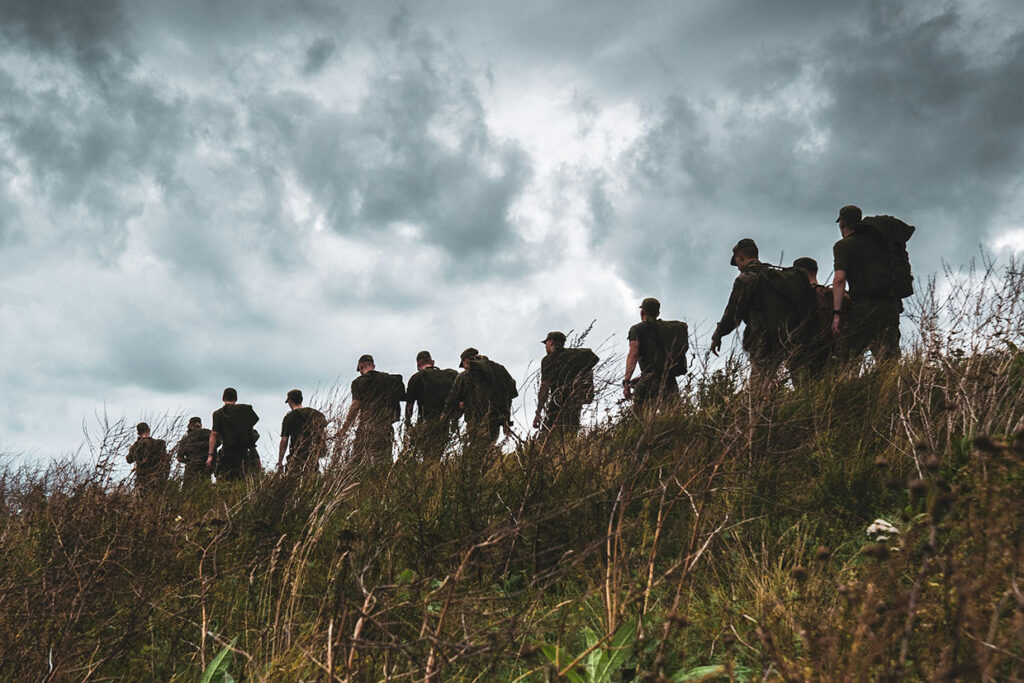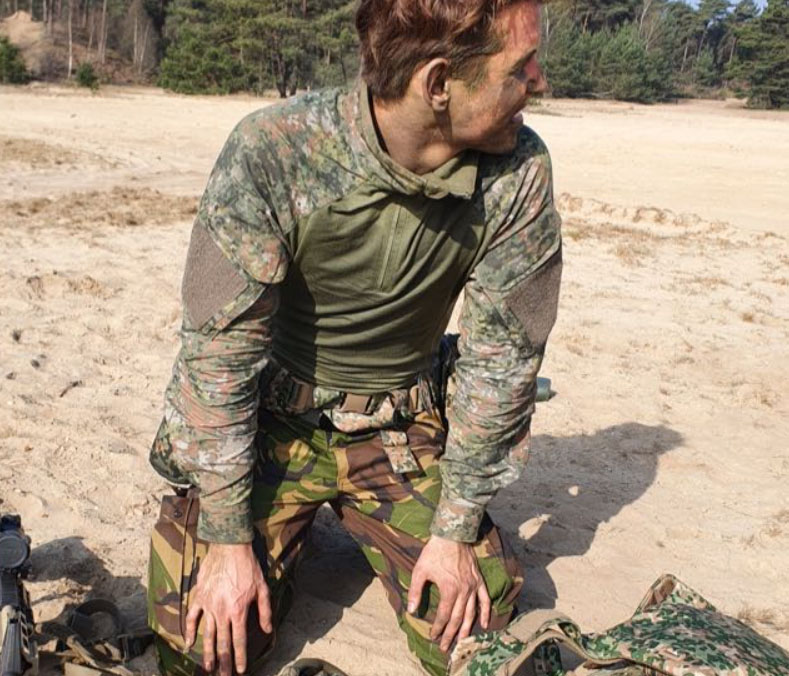Public administration student Noah Brok is reservist with Defense: ‘Carrying a weapon is a huge responsibility’
Noah Brok (22) is a third-year public administration student at Tilburg University and also an active reservist in the Department of Defense. As a child, he played with toy soldiers, now he is a soldier with his own weapon. ‘We sat in a foxhole in the pouring rain eating a bag of pasta.’

What exactly does your side job as a reservist entail?
‘The National Reserve Corps is responsible for guarding and securing the Netherlands. If something happens, we have to be there. Think, for example, of the flood disaster in Limburg in 2021. I wasn’t there myself at the time, but my colleagues there carried sandbags, among other things.
‘A disaster is an acute thing, then you have to get there quickly. The ceremonial tasks we have, such as on the State Opening of Parliament or May 4 and 5, are of course planned in advance.’
What makes you want to become a reservist?
‘I like to do something meaningful for society, something bigger than myself. For example, since 2019, I have also been a municipal councilor in the municipality of Heusden (Brok was once the youngest municipal councilor in the Netherlands, ed.). The same ideology underlies this: wanting to exert myself for someone else.
‘During the coronavirus crisis, I saw a vacancy from the Department of Defense. It asked for people who, in addition to their studies or jobs, aspired to a side job with the Defense Department. I applied for it.
My twin brother and I used to play with toy soldiers, and I watched war films with my grandfather. I also used to visit military events where people would drive around in tanks, for example. When I went to university, this fascination faded a bit into the background. Until I saw this vacancy.’
A job as a reservist is probably not for everyone. What does the selection process consist of?
‘You have to go through extensive physical and psychological selection. During the physical selection, you have to show that you can run certain distances, drag weights, and walk a number of kilometers with a backpack weighing about thirty kilos. These are things you can train quite well for beforehand.
‘A reservist is not a professional soldier, so you don’t have to meet exactly the same requirements as a member of the Commandos Corps, which is really a different level. I have a lot of respect for people who complete that training, because there are very few of them: about four out of every hundred.’
And at a mental level?
‘One of the first things you learn is that you have to be willing to go through fire and water for each other. You have to be able to take that extra step when someone in your group is having a hard time. You also have to explain how much you want to work as a reservist and how you think you will handle certain situations.
‘Once you pass that initial examination, you may do a two-week internal training course. During this you learn the basics of working in the Defense Department, just like a regular soldier: shooting, guarding, patrolling, and also a lot of theory from a book.’
You go straight to work with a weapon?
‘On the first day I was given my weapon. And at the end of the day I was expected to know in detail how that weapon works. The following days, I spent learning to shoot it and making sure it stays clean. In the second week of training, we went into the woods for a few days and nights to put everything we had learned into practice.’

You step into a totally different world.
Laughs: ‘It is indeed something different from studying. Beforehand I didn’t know exactly what I was getting into, but during the training I thought: this is super cool work to be able to do! It can’t be compared to a part-time job as a shelf stacker although that is also valuable work, of course. But when you are taken out of bed at night and the enemy takes you under fire for practice … that is a different experience compared to working in the supermarket.’
Do you also get a better salary than in a supermarket?
‘I think you get paid quite reasonably. As a reservist you have so-called standby duty. Those are days you have to be there, in my case at the barracks in Oirschot. Usually, these are two Tuesdays and two Saturdays per month. Your income depends on how many days you are actually there, which can vary. I think it’s good that reservists have so many turnouts. The idea is that you have to meet the standards of a military man, so you have to stay level.’
You just told us that on the first day you immediately get a gun. Can you describe what that does to you?
‘I found that quite confronting. After all, it is a machine with which you can do something to another person. That is a huge responsibility. The very realization that you can cause a lot of damage with such a weapon makes me handle it with extra care. Safety is always the number one priority at Defense, and that is taught to you straight away’.
What kind of weapon is it actually?
‘It’s a Colt C7 (standard weapon of the Dutch armed forces, ed.), which is a pretty big thing. The weapon is locked away at the barracks; I can only access it when I’m on duty. During training, you always have it on you because you have to learn to take responsibility for it. So I also took it with me when I had to go to the bathroom.
‘Working in Defense requires discipline. If my weapon is broken or dirty, that’s my responsibility. If I lose something, the whole platoon has to join in the search. Even if they are tired or haven’t slept.’ Laughs: ‘So that never happens to you again! These are hard lessons in discipline.’
As a reservist, what lessons do you take with you into regular life?
‘That you have to lead, but you also have to be able to undergo leadership. As a council member, I benefit from this: sometimes you have to dare to take the lead or be decisive. I am very good at taking the lead when I am sure of my case because I always want to do things right. But at Defense I’ve since learned that you can’t always do things right.’
What do you like best about being a reservist?
‘The camaraderie within the group. You go through so much together that you really become friends. But also when I’m on exercises for several days, don’t get much sleep and then perform actions where I have to help wounded soldiers. In that, everything comes back from what it means to be in the military. I remember sitting in a foxhole in the woods. We were eating a bag of pasta while it was raining cats and dogs. I thought, it’s like being in a war series like Band of Brothers.’
Translated by Language Center, Riet Bettonviel






